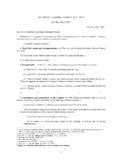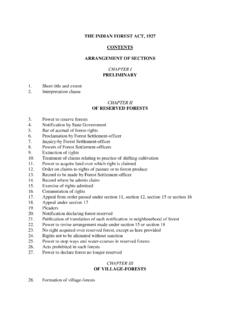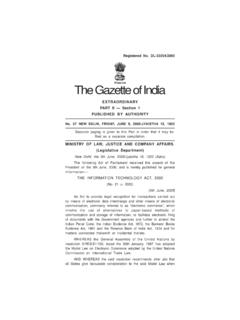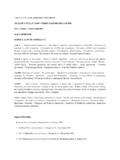Transcription of Indian Succession Act 1925 - District & Sessions …
1 Collected by the All India Christian Council, Page 1 of 123 THE Indian Succession ACT, 1925 ACT No. 39 OF 1925 1* [30th September, 1925.] An Act to consolidate the law applicable to intestate and testamentary Succession 2*; WHEREAS it is expedient to consolidate the law applicable to intestate and testamentary Succession 2*; It is hereby enacted as follows:-- PART I PRELIMINARY 1. Short Act may be called the Indian Succession Act, 1925. 2. In this Act, unless there is anything repugnant in the subject or context,-- (a) "administrator" means a person appointed by competent authority to administer the estate of a deceased person when there is no executor; (b) "codicil" means an instrument made in relation to a will, and explaining, altering or adding to its dispositions, and shall be deemed to form part of the will; 3*[(bb) " District Judge" means the Judge of a principal Civil Court of original jurisdiction.]
2 ] (c) "executor" means a person to whom the execution of the last will of a deceased person is, by the testator's appointment, confided; 4*[(cc) "India" means the territory of India excluding the State of Jammu and Kashmir;] (d) " Indian Christian" means a native of India who is, or in good faith claims to be, of unmixed Asiatic descent and who professes any form of the Christian religion; (e) "minor" means any person subject to the Indian Majority Act, 1875 (9 of 1875.), who has not attained his majority within the meaning of that Act, and any other person who has not completed the age of eighteen years; and "minority" means the status of any such person; ---------------------------------------- ------------------------------ 1 The Act has been extended to Berar by the Berar Laws Act, 1941 (4 of 1941) and to Manipur by the Union Territories (Laws) Amendment Act, 1956 (68 of 1956).
3 Extended to and brought into forco in Dadra and Nagar Haveli ( ) b Reg. 6 of 1963, s. 2 & Sch. I. 2 The words "in the Provinces of India" omitted by the A. O. 1950. 3 Ins. by Act 18 of 1929, s. 2. Collected by the All India Christian Council, Page 2 of 123 4 Ins. by Act 3 of 1951, s. 3 and Sch. ---------------------------------------- ------------------------------ (f) "probate" means the copy of a will certified under the seal of a Court of competent jurisdiction with a grant of administration to the estate of the testator; 1*[(g) "State" includes any division of India having a Court of the last resort;] and (h) "will" means the legal declaration of the intention of a testator with respect to his property which he desires to be carried into effect after his death.
4 3. Power of State Government to exempt any race, sect or tribe in the State from operation of Act. - (1) The State Government may, by notification in the Official Gazette, either retrospectively from the sixteenth day of March, 1865, or prospectively, exempt from the operation of any of the following provisions of this Act, namely, sections 5 to 49, 58 to 191, 212, 213 and 215 to 369, the members of any race, sect or tribe in the State, or of any part of such race, sect or tribe, to whom the State Government considers it impossible or inexpedient to apply such provisions or any of them mentioned in the order.
5 (2) The State Government may, by a like notification, revoke any such order, but not so that the revocation shall have retrospective effect. (3) Persons exempted under this section or exempted from the operation of any of the provisions of the Indian Succession Act, 1865 2* (10 of 1865.), under section 332 of that Act are in this Act referred to as "exempted persons". PART II OF DOMICILE 4. Application of Part shall not apply if the deceased was a Hindu, Muhammadan, Buddhist, Sikh or Jaina. 5. Law regulating Succession to deceased person's immoveable and moveable property, respectively. -(1) Succession to the immoveable property in 3*[India] of a person deceased shall be regulated by the law of 3*[India], wherever such person may have had his domicile at the time of his death.
6 ---------------------------------------- ----------------------------- 1 Subs. by Act 3 of 1951, s. 3 and Sch., for the original cl. 2 Rep. by this Act. 3 Subs. by Act 3 of 1951, s. 3 and Sch., for "the States". ---------------------------------------- ----------------------------- (2) Succession to the moveable property of a person deceased is regulated by the law of the country in which such person had his domicile at the time of his death. Illustrations (i) A, having his domicile in 1*[India], dies in France, leaving moveable property in France, moveable property in England, and property, both moveable and immoveable, in 1*[India].
7 The Succession Collected by the All India Christian Council, Page 3 of 123 to the whole is regulated by the law of 1*[India]. (ii) A, an Englishman, having his domicile in France, dies in 1*[India], and leaves property, both moveable and immoveable, in 1*[India]. The Succession to the moveable property is regulated by the rules which govern, in France, the Succession to the moveable property of an Englishman dying domiciled in France, and the Succession to the immoveable property is regulated by the law of 1*[India]. 6. One domicile only affects Succession to person can have only one domicile for the purpose of the Succession to his moveable property.
8 7. Domicile of origin of person of legitimate domicile of origin of every person of legitimate birth is in the country in which at the time of his birth his father was domiciled; or, if he is a posthumous child, in the country in which his father was domiciled at the time of the father's death. Illustration At the time of the birth of A, his father was domiciled in England. A's domicile of origin is in England, whatever may be the country in which he was born. 8. Domicile of origin of illegitimate domicile of origin of an illegitimate child is in the country in which, at the time of his birth, his mother was domiciled.
9 9. Continuance of domicile of domicile of origin prevails until a new domicile has been acquired. 10. Acquisition of new A man acquires a new domicile by taking up his fixed habitation in a country which is not that of his domicile of origin. man is not to be deemed to have taken up his fixed habitation in 1*[India] merely by reason of his residing there in 2*[the civil, military, naval or air force service of Government], or in the exercise of any profession or calling. ---------------------------------------- ----------------------------- 1 Subs. by Act 3 of 1951, s. 3 and Sch., for "the States".
10 2 Subs. by the A. O. 1950, for "His Majesty's civil, military, naval or air force service". ---------------------------------------- ----------------------------- Illustrations (i) A, whose domicile of origin is in England, proceeds to 1*[India], where he settles as a barrister or a merchant, intending to reside there during the remainder of his life. His domicile is now in 1*[India]. (ii) A, whose domicile is in England, goes to Austria, and enters the Austrian service, intending to remain in that service. A has acquired a domicile in Austria. (iii) A, whose domicile of origin is in France, comes to reside in 1*[India] under an engagement with the Central Government for a certain number of years.








